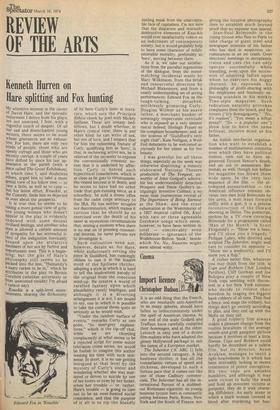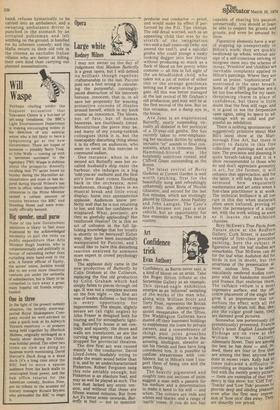Cinema
Import licence
Christopher Hudson
— — It is an odd thing that the French, who are resolutely anti-American in so many spheres, should have fallen so indiscriminately under the spell of American cinema. At one end of the scale Godard and Truffaut have carefully compiled their hommages, and at the other, Lelouch is only one of a dozen film-makers who have adapted the glossy Hollywood package to suit the tastes of a European market.
The Inheritor ('A' ABC 1) falls into the second category. A big business thriller, it has all the transatlantic virtues of speed and slickness, developed to such a furious pace that it comes out like one of those Cadbury commercials, The Inheritor has all the international flavour of a stubbedout Rothmans cigarette: its young business tycoon hero is constantly jetting between Paris, Rome, New York and the South of France, not
giving the location photography time to establish much beyond proof that no expense was spared.
Jean-Paul Belmondo is the young tycoon who flies to Paris to take charge of giant steel and newspaper interests of his father who has died in suspicious cir cumstances in an air crash. Over directors' meetings in aeroplanes, trains and cars (he can only
operate successfully while travelling, even upon the succession of admiring ladies upon whom he exercises his doggy charms), he expounds his philosophy of profit-sharing with the employees and fearlessly exposing scandals in his weekly .Time-style magazine. Such radicalism naturally provokes complaints from the board, and his retorts ("It's demagoguery," "No, it's realism"; "You mean a leftist press?" "No — a popular one") .show him to have the same brilliant, incisive mind as his father.
An Italian neo-fascist organisation who want to establish a number of multinational consortia over which they have political control, turn out to have engineered Tycoon Senior's death, and set out to assassinate Belmondo as well, though not before his magazine has blown them wide open. In the very last sequence of the film — the attempted assassination — the American influence remains obvious: two men hold Belmondo by the arms, a man leans forward stiffly with a gun, it is a precise reconstruction of the Oswald shooting in Dallas. The postscript, spoken by a TV crew covering Belmondo for a programme called 'Man of the Month,' is Scott Fitzgerald's — "Show me a hero, and I'll show you a tragedy." Philippe Labro, who directed and scripted The Inheritor, might well care to consider its opposite — "Show me a mediocrity, and I'll show you a flop."
A rather better film, whatever you may think from the title, is Cops and Robbers ('AA' London Pavilion). Cliff Gorman and Joe Bologna play a couple of New York cops seething with discontent in a hot New York summer, who decide to relieve their boredom by staging the biggest bank robbery of all time. They find a fence, and stage the robbery, but things don't go entirely according to plan, and they end up with the Mafia on their tail. A good robbery film always makes a pleasant change from the routine brutalities of the average smash-and-grab gangster picture because it involves at least a little finesse. Cops and Robbers could hardly be described as a subtle film, but its director, Aram Avakian, manages to instil a light-heartedness in it which has been noticeably lacking in recent treatments of police corruption. His two cops are amiable bumblers, and although it may seem vicious to bully the weak and hold up innocent victims at gunpoint, they do it with charming diffidence. An early scene in which a black woman covered in blood after murdering her hus
band, refuses hysterically to be carried into an ambulance, and a. swearing ambulance driver is punched in the stomach by an irritated policeman and left writhing on the ground, is handled for its inherent comedy; and the Mafia return to their old role in the cinema as excitable Italian villains who are better at killing their own kind than carrying out planned assassinations.



































 Previous page
Previous page